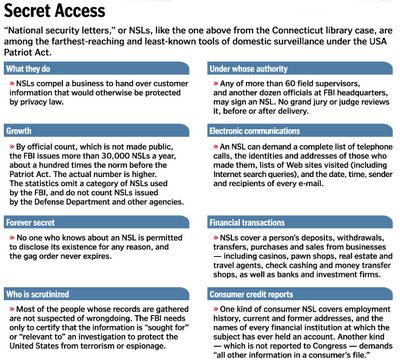Spy
This story is getting plastered all over the world, so what the heck, I'll put it up here.
Kevin Drum offers a nice little chart summarizing how you are being spied upon:

Jeralyn Merritt at TalkLeft on the subject:
The FBI Is Spying on You and MeKeep reading the article. It gets scarier by the paragraph.
The Washington Post reports today that the FBI has been obtaining and reviewing records of ordinary Americans in the name of the war on terror through the use of national security letters that gag the recipients.
The FBI now issues more than 30,000 national security letters a year, according to government sources, a hundredfold increase over historic norms. The letters -- one of which can be used to sweep up the records of many people -- are extending the bureau's reach as never before into the telephone calls, correspondence and financial lives of ordinary Americans.
What's a national security letter?
Issued by FBI field supervisors, national security letters do not need the imprimatur of a prosecutor, grand jury or judge. They receive no review after the fact by the Justice Department or Congress. The executive branch maintains only statistics, which are incomplete and confined to classified reports. The Bush administration defeated legislation and a lawsuit to require a public accounting, and has offered no example in which the use of a national security letter helped disrupt a terrorist plot.
The records it gathers describe where a person makes and spends money, with whom he lives and lived before, how much he gambles, what he buys online, what he pawns and borrows, where he travels, how he invests, what he searches for and reads on the Web, and who telephones or e-mails him at home and at work.
There is no judicial oversight of National Security letters. Also, the Patriot Act lessened the standard the FBI must use in issuing the lettersSwell.
What happens to your information after the investigation is over and it has been established that you have done nothing wrong? Does the FBI destroy its data file on you? No. It used to, but former Attorney General John Ashcroft changed the rules.What, me worry?
Two years ago, Ashcroft rescinded a 1995 guideline directing that information obtained through a national security letter about a U.S. citizen or resident "shall be destroyed by the FBI and not further disseminated" if it proves "not relevant to the purposes for which it was collected." Ashcroft's new order was that "the FBI shall retain" all records it collects and "may disseminate" them freely among federal agencies.
Still, you say, this is just too remote for you to worry about because not only don't you know any terrorists, you don't even know anyone who knows anyone who knows a terrorist. Do you stay at hotels? Do you ever rent a car? Have you ever spent New Years, for example, in Las Vegas? Read on.But of course, any information gathered was destroyed...right? I mean, no one would seriously consider Ashcroft's proposal to actually keep that much information, right?
On December 21, 2003 Homeland Security issued a terror alert due to information about a possible New Years’ terror attack on in Las Vegas. The FBI's Proactive Data Exploitation Unit and its Chief, Gurvais Grigg, were called upon to serve.
An average of about 300,000 tourists a day stayed an average of four days each, presenting Grigg's team with close to a million potential suspects in the ensuing two weeks....Government and private sector sources who followed the operation described epic efforts to vacuum up information..... An interagency task force began pulling together the records of every hotel guest, everyone who rented a car or truck, every lease on a storage space, and every airplane passenger who landed in the city. Grigg's unit filtered that population for leads. Any link to the known terrorist universe -- a shared address or utility account, a check deposited, a telephone call -- could give investigators a start.
When cooperation began drying up for voluntary release of records, the FBI turned to national security letters and grand jury subpoenas
What happened in Vegas stayed in federal data banks. Under Ashcroft's revised policy, none of the information has been purged. For every visitor, Breinholt said, "the record of the Las Vegas hotel room would still exist."Is anyone doing anything about it?
Oh no, that nasty nasty A .... C .... L .... U, sorta:
The ACLU has been actively litigating the legality of the National Security Letters.Just so you know.
Also, the ACLU is less critical than I [TalkLeft] am of activity now taking place in Congress now where conferees of the Senate and House are working out a compromise version of Patriot Act extension legislation that will resolve differences in versions passed by each in the last Congress. The ACLU reports that the Senate version contains some modest improvements respecting your privacy rights while the House version contains further intrustions.
1 Comments:
Welcome to the new McCarthy era.
Post a Comment
<< Home